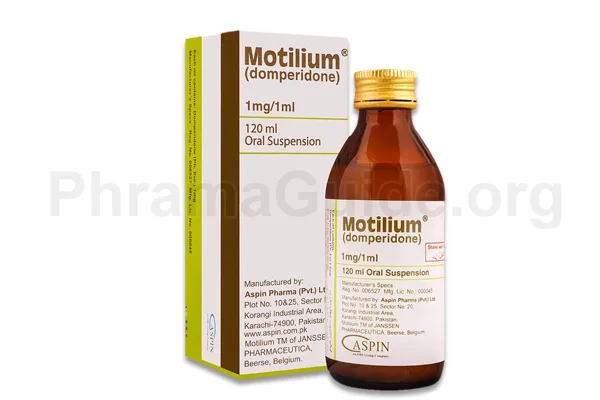Motilium syrup is a medication primarily used for the treatment of gastrointestinal motility disorders. It is an antiemetic (anti-nausea) and prokinetic agent, that increases the movement or contractions of the stomach and intestines, thereby facilitating the passage of food through the digestive system.
- Gastroesophageal Reflux (GERD): Motilium can help alleviate symptoms associated with gastroesophageal reflux disease (GERD), such as heartburn, regurgitation, and discomfort. It works by reducing the frequency and severity of reflux episodes and promoting the movement of food from the stomach to the intestines.
- Nausea and Vomiting: Motilium syrup is commonly prescribed to relieve nausea and vomiting, whether due to various causes such as stomach flu, medication side effects, or chemotherapy-induced nausea. It helps regulate the movement of food through the digestive tract, reducing feelings of nausea and promoting normal digestion.
- Gastroparesis: Gastroparesis is a condition characterized by delayed stomach emptying, leading to symptoms such as early satiety, bloating, nausea, and vomiting. Motilium can be used to improve gastric emptying and relieve associated symptoms in individuals with gastroparesis.
- Functional Dyspepsia: Functional dyspepsia refers to chronic or recurrent indigestion without any apparent structural abnormalities. Motilium may be prescribed to help alleviate symptoms of functional dyspepsia, including upper abdominal pain, bloating, and early satiety.
Off-label Uses of Motilium Syrup
- Milk Production in Breastfeeding: Motilium syrup has been used off-label to increase milk production in breastfeeding women who are experiencing low milk supply. It is thought to work by increasing the release of prolactin, a hormone that stimulates milk production. However, the use of Motilium syrup for this purpose may vary depending on regional regulations and the healthcare provider’s judgment.
- Irritable Bowel Syndrome (IBS): Some healthcare providers may consider using Motilium syrup off-label for the management of symptoms associated with irritable bowel syndromes (IBS), such as abdominal pain, bloating, and altered bowel habits. However, the evidence for its effectiveness in IBS is limited, and other treatment options are generally preferred.
- Migraine Headaches: Motilium syrup has been used off-label in the management of migraine headaches, particularly in cases where there are associated gastrointestinal symptoms, such as nausea and vomiting. It may help in relieving these symptoms and improving tolerance to migraine medications.
- Parkinson’s Disease: Motilium syrup has been investigated for its potential benefit in managing gastrointestinal symptoms, such as gastroparesis, in individuals with Parkinson’s disease. These symptoms can include delayed gastric emptying, nausea, and bloating. However, the use of Motilium syrup in Parkinson’s disease is not universally accepted, and other treatment options are also available.

What is Motilium?
Motilium Syrup is one of the leading brands of Domperidone in oral liquid form, manufactured and marketed by Janssen Pharmaceutica.
Motilium Alternatives : Other Similar Brands
The following are some alternative brands of Motilium Syrup and their manufacturers.
- Domel : Barrett Hodgson Pakistan (Pvt) Ltd, Pakistan.
- Peridone : Sami Pharmaceuticals (Pvt) Ltd, Pakistan.
- Vomilux : Atco Laboratories, Pakistan.
- Pelton V : Global Pharmaceuticals (Pvt) Ltd, Pakistan.
- Emiset : Platinum Pharmaceuticals (Pvt) Ltd, Pakistan.
- Domflash : Next Pharma (Pvt) Ltd, Pakistan.
- Stomacol : High Q Pharmaceuticals (Pvt) Ltd, Pakistan.
- Nomit : Le Mendoza Pharmaceuticals (Pvt) Ltd, Pakistan.
- Emidone : Pharmix Laboratories (Pvt) Ltd.
- Millium : English Pharmaceuticals Industries.
Motilium : Available Formulations and Strengths
Presently, Motilium is available in Syrup and Tablet forms.
Motilium Syrup : 1mg/ml strength.
Motilium Tablet : 10mg strength.
Who Should Not Use Motilium?
There are some conditions that may contraindicate the use of either Motilium Syrup.
Hypersensitivity or Allergy: Individuals who have a known hypersensitivity or allergy to Motilium or any of its components should avoid its use.
Gastrointestinal Perforation or Obstruction: Motilium is contraindicated in individuals with gastrointestinal perforation (a hole or tear in the digestive tract) or obstruction (blockage) due to the risk of worsening these conditions.
Prolactinoma and Hyperprolactinemia: Motilium is contraindicated in individuals with a known or suspected prolactinoma (a benign tumor of the pituitary gland) or hyperprolactinemia (high levels of prolactin hormone), as it can increase prolactin levels further.
Severe Liver Dysfunction: Motilium is primarily metabolized in the liver, and its elimination may be significantly reduced in individuals with severe liver dysfunction. It is contraindicated in such cases due to the increased risk of side effects and prolonged drug exposure.
Cardiac Disorders: Motilium is contraindicated in individuals with pre-existing cardiac disorders, including certain arrhythmias (abnormal heart rhythms) such as prolonged QT interval, ventricular arrhythmias, and significant electrolyte disturbances.
What is the Recommended Daily Dosage of Motilium Syrup?
- Motilium Syrup Dose for Adults:
- 10-20 mg (2-4 teaspoons) of Motilium syrup, taken three to four times a day.
- The maximum daily dose is generally 80 mg (16 teaspoons) per day.
- Motilium Dose for Children:
- The dosage for children is based on their weight. It is typically prescribed as 0.25-0.5 mg/kg of body weight, up to a maximum of 2.4 mg/kg.
- The total daily dose is usually divided into three to four doses.
How Motilium Works?
Motilium primarily acts on dopamine D2 receptors in the GI tract. By blocking these receptors, it inhibits the inhibitory effect of dopamine on gut motility. This leads to an increase in the peristaltic movements (contractions) of the stomach and intestines, promoting the passage of food through the digestive system and improving gastric emptying. As a result, it can help alleviate symptoms such as nausea, vomiting, bloating, and discomfort associated with delayed gastric emptying or motility disorders.
Related Links:

Leave A Comment